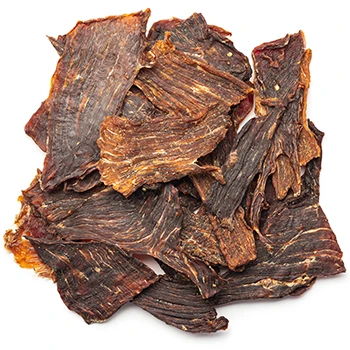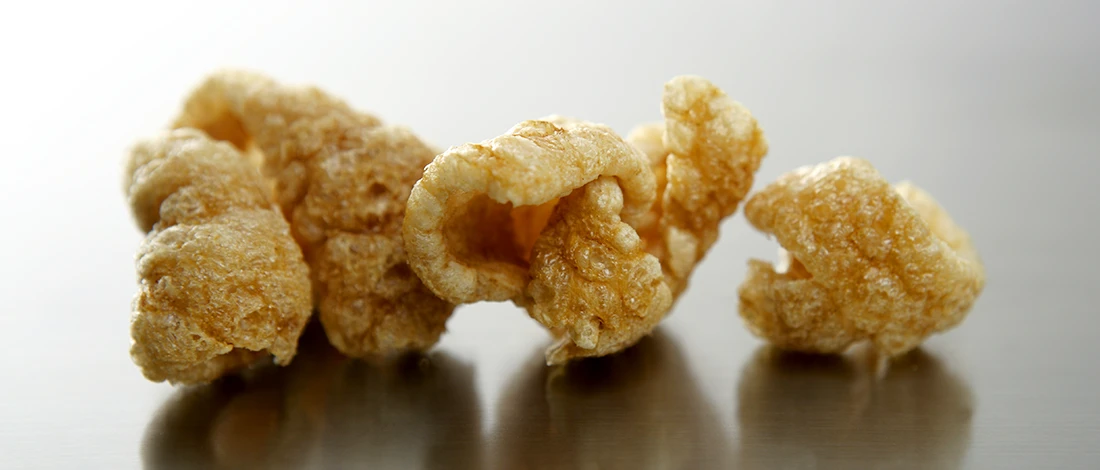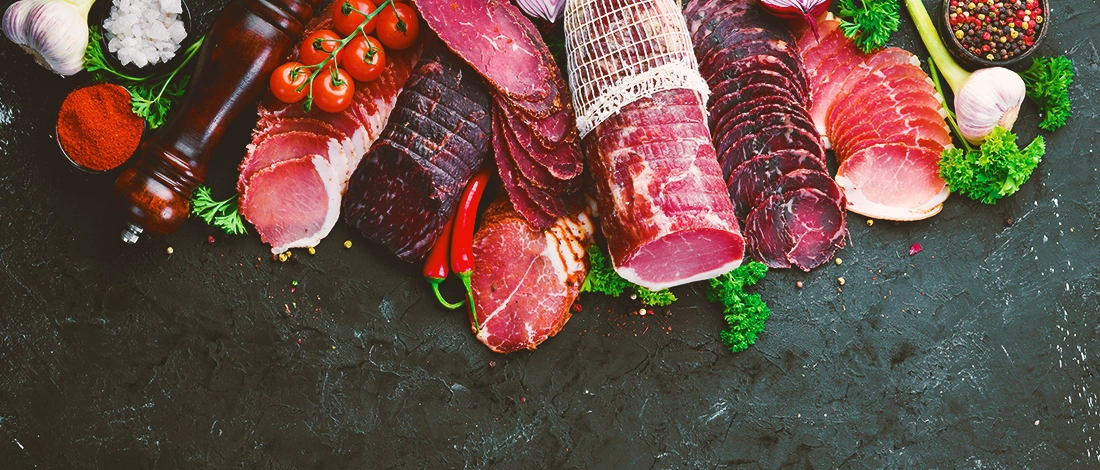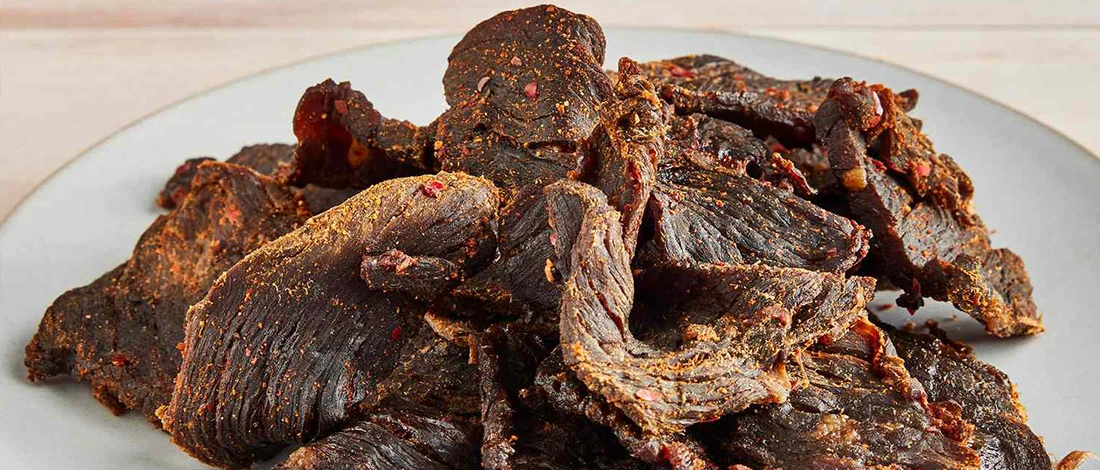As a liberal carnivore dieter, I've had my fair share of beef jerky. I recently transitioned into a more strict version of the diet, which necessitates cutting down on certain processed meat products.
But because I love my teriyaki jerky, I've been contemplating whether I should keep or cut it off. I talked to my dietician to find out if beef jerky is an excellent addition to a strict carnivore diet routine.
Is beef jerky good for you?
Read on to find out.
Quick Summary
- Beef jerky is a high-protein, low-carb snack made from cured lean cuts of beef, and can be a healthy addition to various diets when consumed in moderation.
- Despite its benefits, overconsumption of beef jerky can lead to high sodium intake, weight gain, and excessive cholesterol consumption due to its high salt, calorie, and saturated fat content.
- Compared to natural meat, healthy beef jerky has a tougher texture and intense flavor due to the extra processing.
What is Beef Jerky?

Beef jerky is meat cured in a brine solution till its moisture content decreases to under 50%.
The best beef jerky is made from lean, range-fed, 100% premium beef that's USDA-approved. Some producers use ground beef to prepare their beef jerky, and the final product has a somewhat distinct texture.
While beef is the most common meat used to make jerky, other meats like pork, chicken, salmon, and turkey are also utilized. More than five pounds of beef are typically needed to make one pound of beef jerky.
I find that healthy beef jerky often has a tough leathery texture. This is caused mainly by the moisture removal technique when curing.
Beef jerky has a brown tint, and the flavor is more robust than unprocessed beef. It is marketed as a wholesome, high-protein snack that is low in calories, cholesterol, and fat.
Beef jerky comes in different flavors, including:
- Teriyaki jerky (my favorite)
- Pepper flavored jerky
- Hot style jerky
- Barbecue style jerky
- Hickory smoked jerky
- Maple spice jerky

Beef Jerky Nutrition

Overall, beef jerky is healthy and nutrient-packed.
Let's look at the nutritional breakdown of beef jerky [1].
A 100g of beef jerky serving has :
- Calories: 410 kcal
- Energy: 1720 KJ
- Protein: 33.2 g
- Saturated fat: 25.6 g
- Carbohydrates: 11 g
- Fiber: 1.8 g
- Calcium: 20mg
- Magnesium: 51 mg
- Potassium: 597 mg
- Sodium: 1780 mg
I found that beef jerky has a richer nutritional profile than most other meat snack foods. Because of its high protein and low carb content, beef jerky is ideal for various diets, including carnivore, paleo, and keto.
When camping in the woods, I love to pack extra beef jerky when I have a restricted supply of fresh meals and require a protein boost.
4 Health Benefits of Beef Jerky

Here's how your body benefits from eating beef jerky in moderation.
1. Boosts Immunity
Zinc is abundant in beef jerky. According to research, a healthy immune system depends on sustaining micronutrient homeostasis [2].
A vitamin called zinc helps balance this homeostasis by controlling innate and adaptive immune system responses.
2. Boosts Energy
Iron, with a high biological value, is also abundant in beef jerky. Research has demonstrated the importance of iron due to its involvement in the creation of energy and oxygen distribution [3].
Because the body cannot produce iron, you must eat iron-rich foods, and beef jerky is a great place to start.
3. Enhances Bone Health
Phosphorus is a mineral that is also widely present in beef jerky.
According to research, phosphorus is essential for keeping strong bones and teeth [4].
Perhaps you thought calcium was responsible for this. However, phosphorus is required to bind with calcium to fulfill the fortification process.
In addition to acting as a buffer and regulating blood pH, phosphorus also helps turn fat, carbs, and protein into energy [5].
4. Strengthens Heart Health
Potassium, abundant in beef jerky, encourages heart muscle activity, which aids in promoting smooth blood circulation via the arteries [6].
Aside from the health benefits, tender jerky serves as the ideal protein for travelers and active people. Beef jerky has a long shelf life due to the drying process.
Additionally, it is lightweight, making it an excellent option for travel, hiking, and other activities when fresh food is hard to come by and you need a protein boost.
Read More: Is Beef Healthier Than Chicken?
3 Side Effects of Beef Jerky

Overeating beef jerky has these potential side effects:
1. Too Much Sodium Intake
100 g of beef jerky contains roughly 1700 mg. As a result of the high salt content of beef jerky, overeating may result in high blood pressure [7].
Your chance of developing renal disease, heart disease, and stroke rises if you're an all-the-time jerky eater [8].
2. Weight Gain Risks
You will gain roughly 115 calories for every ounce of beef jerky you eat. Eating beef jerky regularly without any exercise regimen can cause rapid weight gain regardless of age.
3. Excessive Cholesterol Consumption
Consuming too much beef jerky may also result in elevated cholesterol levels in the body.
A 1-ounce serving of beef jerky contains roughly 7.3 g of saturated fat and 13.6 mg of cholesterol. These can add up quickly if you eat jerky frequently.
I recommend moderating your beef jerky intake since it's high in some of the not-so-good nutrients. Think of it as an occasional healthy snack treat and strive for filler and gluten-free meat snack alternatives.
"Beef jerky is processed meat, and eating too much of it can increase your risk of heart disease and cancer."
- Cynthia Sass, MPH Registered Dietician
Tips For Choosing The Healthiest Jerky Meat

Choosing the correct jerky is crucial because some commercially available types are heavily processed and loaded with sea salt and preservatives. Here are my tips and tricks for getting the right beef jerky.
- Go for low sodium: Always buy beef jerky with less than 300 milligrams of sodium. Read the label to know the sodium concentration.
- Pick high-quality ingredients jerky: For a more nutritious source of protein, go for healthy jerky brands that use grass-fed beef and have an authentic ingredients list. Avoid those with extra additives and sweeteners like corn syrup or monosodium glutamate (MSG).
- Go for more protein: The lean protein in organic beef jerky is one of its main advantages. These proteins are packed with amino acids, the building blocks of healthy muscles. Keep off commercial jerky products with less than 10 grams of protein per serving.
- Buy low-fat jerky: Since lean beef cuts are used to make beef jerky, it often contains little fat. Even so, it's crucial to read the nutrition label to ensure that each serving doesn't include more than 3 grams of fat.
- Avoid added sugars: This gas station junk food can have a surprisingly high quantity of hidden sugar. Small amounts of sugar give the jerky some texture and a well-balanced flavor, but too much of it is unhealthy. If you must, grab the ones with a maximum of 3 grams of sugar per serving. Because I always strive to avoid sugar altogether, I go for healthier beef jerky options with zero sugar.
You can order binder and junk-free, handmade beef jerky from any of these trusted meat delivery websites that I've been using for the past five years.
Related Article: For How Long Does Beef Jerky Last?
FAQs
Is Beef Jerky Healthy for Weight Loss?
Yes, beef jerky is healthy for weight loss because it's a protein powerhouse. But ensure you consume it in moderation since it's a processed product.
Is Beef Jerky Healthier Than Meat?
No, beef jerky isn't healthier than meat. Since all beef jerky is processed meats, they have a high fructose corn syrup concentration among other artificial ingredients, making them less healthy.
Is Beef Jerky Healthy to Eat Every Day?
No, beef jerky isn't healthy to eat every day. It's packed with high sodium and cholesterol levels, posing certain health risks if consumed excessively.
References:
- https://fdc.nal.usda.gov/fdc-app.html#/food-details/167536/nutrients
- https://www.ncbi.nlm.nih.gov/pmc/articles/PMC2277319/
- https://www.ncbi.nlm.nih.gov/pmc/articles/PMC7761418/
- https://www.webmd.com/osteoporosis/news/20020320/bones-need-both-calcium-phosphorus
- https://www.mountsinai.org/health-library/supplement/phosphorus#
- https://www.nih.gov/news-events/nih-research-matters/how-too-little-potassium-may-contribute-cardiovascular-disease#
- https://www.cdc.gov/heartdisease/sodium.htm#:~:text=The%20body%20needs%20a%20small,for%20heart%20disease%20and%20stroke.
- https://www.hsph.harvard.edu/nutritionsource/salt-and-sodium/








